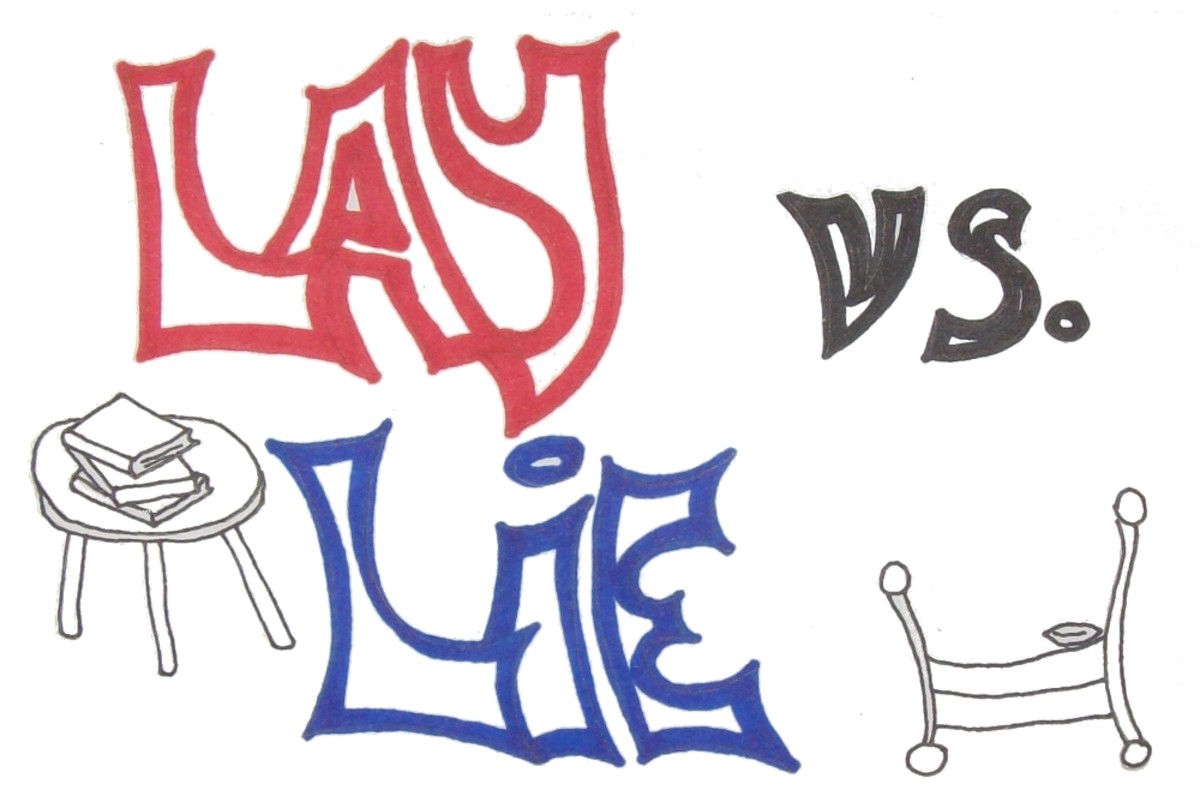- HubPages»
- Books, Literature, and Writing»
- Commercial & Creative Writing»
- Word Usage & Grammar
Common Writing Mistakes and How to Avoid Them: Part 2

Why Words Matter
Perhaps Mark Twain said it best: "The difference between the almost right word and the right word is really a large matter; ’tis the difference between the lightning bug and the lightning."
As the writers of Essays That Will Get You into College point out, "Using a thesaurus will not make you look smarter. It will only make you look like you are trying to look smarter." That's why you don't indiscriminately choose a synonym from the dictionary or thesaurus.
Unfortunately, I saw this frequently in my time scoring ninth-grade standardized tests. The response would be going smoothly, until a student decided that orated was preferable to said. The problem was, the student was talking about two friends having a normal conversation. In that context, orated wouldn't have been appropriate unless one person was standing on a podium giving a speech. Rather than making the student look more eloquent, it made me think the student had taken a teacher's advice to avoid using said at all costs.
The writer's goal is to convey a message clearly, concisely, and correctly. One way to do this is to use the right words to convey our message.

Frequently Confused Homophones
Sometimes, we use the wrong word because so many words in English are homophones. In other words, they sound the same but mean different things.
- accept/except: Accept is always a verb. It means "to take." Except is a preposition that means "other than." (This restaurant accepts all credit cards except Diners Club.)
- affect/effect: Affect is always a verb. Effect is almost always a noun. (The wind will affect the tennis game. The wind will have a bad effect on the tennis game.)
- allude/elude: Allude means "to make an indirect reference to something." Elude means "to escape." Thus, a movie may allude to classic literature, but a fugitive eludes the police.
- allusion/illusion: As explained above, an allusion is an indirect reference to something. An illusion is like a mirage—the way we perceive something that may or may not be there. (An editorial cartoon may use allusions to past events to comment on current event. A magician excels at illusions.)
- break/brake: Break can be a noun or a verb. A burglar breaks into a house. An employee takes a break. You go to jail if you break the law. Brake is also a noun or a verb, but it usually relates to stopping. You brake (or hit the brakes) to stop the car.
- compliment/complement: If two things compliment each other, they go well together. A teacher may also compliment a student for turning in good work. If two things complement each other, they complete each other. A lock and key complement each other because you can't undo the lock without the key. A direct object in a sentence is a complement because it completes the sentence. (Notice that both complete and complement start with comple.)
- elicit/illicit: Elicit is a verb meaning "to evoke; to draw out." Illicit is an adjective meaning "forbidden by law or rules." Thus, a probing question may elicit a thoughtful response, but a Ponzi scheme is illicit.
- its/it's: Its is an adjective meaning "belong to it." It's is a contraction meaning "it is" or "it has." Confusion comes when we use the apostrophe to show possession. (It's normal to expect a penguin to protect its eggs.)
- immigrate/emigrate: One immigrates into a country. One emigrates from a country.
- no/know: No is the opposite of yes. Know means "to be aware of or familiar with." (No, I don't know what the capital of Equatorial Guinea is.)
- passed/past: Passed is the past tense of the verb pass. Past can mean "before now." (In the past, computers were the size of entire rooms.) It can also relate to moving from one side of something to the other. (Driving past the school brought back memories.)
- principal/principle: The principal is in charge of the school. You may also make a payment toward the principal on a loan. A principle is the basic foundation of an idea or belief system.
- reign/rein: Reign is a verb or noun, synonymous with rule. (Queen Victoria's reign was the longest of any English monarch.) Rein is also a noun or a verb, Reins are what a horse rider grips to guide the horse. A company may also rein in the spending.
- sale/sell: Sale is a noun. Sell is almost always a verb. A sale is the act of selling. Thus, a vendor makes a sale when he sells something. (In the expression sale prices, sale is an adjective.)
- stationary/stationery: Stationary is always an adjective or adverb. It means "unmoving." Stationery is always a noun. It refers to paper goods used to write notes or letters. Thus, a statue is stationary, but we use our best stationery to write a thank-you note.
- their/there/they're: Their means "belonging to them." There means "in that place." (It can also be used as an expletive to show the existence of something: There are three branches of government.) They're is a contraction meaning "they are." (They're crazy if they think there is gold in their backyard.)
- your/you're: Your means "belonging to you." You're is a contraction for "you are." (You're going to be late if you don't finish your breakfast.")
A Side Note About Homophones
Sometimes, we may use malapropisms. The poet Lord Byron is believed to be the first person to use the term, which comes from a French expression meaning "badly placed." He described a malapropism as a "word error" in which the speaker incorrectly replaces one word with a similar-sounding word.
The baseball player Yogi Berra was well known for using malapropisms to humorous effect. One of his better-known malapropisms was "He hits from both sides of the plate. He’s amphibious." Let's hope that the player Berra referred to wasn't actually able to live both on land and in the water. Rather, the player was probably ambidextrous, or able to use both hands equally well.
The teacher who admonishes students, "Please do not congratulate at my door before class," probably doesn't mean that students shouldn't say, "Congratulations," if they're at the door. It's more likely that the teacher doesn't want students to congregate at the door.
Although malapropisms can be used when writing dialogue, they should be avoided in formal writing.
Malapropisms, also called Yogiisms
Words That Don't Mean What You Think They Mean
When many of us think of a podium, we think of what the speaker stands behind. Yet, as writing coach Paula LaRocque pointed out in an article for the Dallas Morning News, the podium is actually the platform where the speaker stands. I looked it up in the dictionary, and—sure enough—I had made the same mistake. I later learned that the speaker in a class or convocation is actually standing behind a lectern. (In church, the speaker stands behind a pulpit.)
That's just one instance of a commonly-used word being used incorrectly. Here is a brief list of other common words whose meanings we often confuse:
- infer vs. imply: The listener infers (comes to a conclusion about what something means). The speaker implies (obliquely suggests something but does not explicitly say it).
- nauseated vs. nauseous: A nauseated person feels sick to the stomach. A nauseous person or thing causes nausea.‡
- disinterested vs. uninterested: A disinterested person is impartial. An uninterested person doesn't care. Thus, a judge should be disinterested in the facts of a case, but a stranger would be uninterested in the facts of a case.
- flammable vs. inflammable: Although William Strunk, author of the Elements of Style, and other purists have balked at using flammable (rather than inflammable) to mean "easily set on fire," the Oxford English Dictionary explains that the two words are synonyms. Flammable is used because it is more common.
- loan vs. lend: Loan is more correctly used as a noun. Lend is always a verb. A bank client may request a loan from the bank, who may or may not lend it to him. (In the following sentence, loan is used as an adjective: It would be unwise to ask a loan shark to lend you money.)
- climatic vs. climactic: Climatic refers to climate. Climactic refers to a climax. Thus, a major scene in a movie or story is climactic. The effect of global warning is climatic.
- comprised vs. composed: The whole comprises the parts. The parts compose the whole. (It is always incorrect to say "comprised of.") Thus, the U.S. Senate comprises 100 members, but the House of Representatives is composed of 435 members.
Can you think of any others? Post in the comments area below.
‡ According to the American Heritage Dictionary's usage panel, the use of nauseous to mean "feeling sick to the stomach" is gradually gaining acceptance among usage experts.
Since there is abundant evidence for the “feeling sick” use of nauseous, the word presents a classic example of a word whose traditional, “correct” usage has largely been supplanted by a newer, “incorrect” one. In other words, what was once considered an error is now standard practice. Nauseous is now far more common than nauseated in describing the sick feeling.








